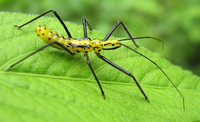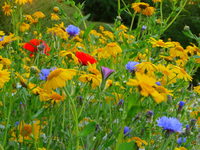Difference between revisions of "Observe"
(→Key Stage 2) |
|||
| Line 19: | Line 19: | ||
==Key Stage 2== | ==Key Stage 2== | ||
===Meaning=== | ===Meaning=== | ||
| − | To '''observe''' is to use our [[Sense|senses]] to study something very carefully or use a tool | + | To '''observe''' is to use our [[Sense|senses]] to study something very carefully or use a tool to [[measure]] something. |
: '''[[Verb]]''': To observe | : '''[[Verb]]''': To observe | ||
: '''[[Noun]]''': Observation | : '''[[Noun]]''': Observation | ||
| + | |||
| + | ===About Observing=== | ||
| + | : We might [[Sight|watch]] and [[Hearing|listen]] and if it is safe then we might [[smell]] or even [[touch]] something to '''observe''' it. | ||
| + | : We might also use a [[ruler]] to [[measure]] the [[length]] of something or a [[timer]] to [[measure]] how long it takes for something to happen. | ||
===Examples=== | ===Examples=== | ||
Revision as of 08:06, 20 August 2018
Contents
Key Stage 1
Meaning
To observe is to watch and listen to something very carefully.
Examples

|

|

|
| A scientist observes the number of legs on an insect. | A scientist observed that a cat makes a "meow" sound. | A scientist made observations of the colour of different flowers. |
Key Stage 2
Meaning
To observe is to use our senses to study something very carefully or use a tool to measure something.
About Observing
- We might watch and listen and if it is safe then we might smell or even touch something to observe it.
- We might also use a ruler to measure the length of something or a timer to measure how long it takes for something to happen.
Examples
- A scientist uses a timer to see how long it takes for a kettle to boil.
- A scientist took one picture of a plant every day to see how it grows.
- A scientist touched a window, a brick and some carpet to find out which one had the roughest texture.
Used in a Sentence
- A scientist to observes how long it takes a kettle to boil one cup of water.
- A scientist observed the growth of a plant by taking a picture every day.
- A scientist wrote down observations of the texture of different surfaces.
Key Stage 3
Meaning
To observe is to collect information during an experiment using our senses and measuring tools and record that information.
Key Stage 4
Meaning
To observe is to collect and record information during an experiment using scientific tools and instruments. Any data collected during an experiment is called an 'observation'.
Key Stage 5
To observe is to collect and record information during an experiment using scientific tools and instruments ideally in a way that does not affect the experiment. In some experiments observing is not a passive activity and the act of observing changes the results of the experiment.